BALLYMENA WAR MEMORIAL PARK
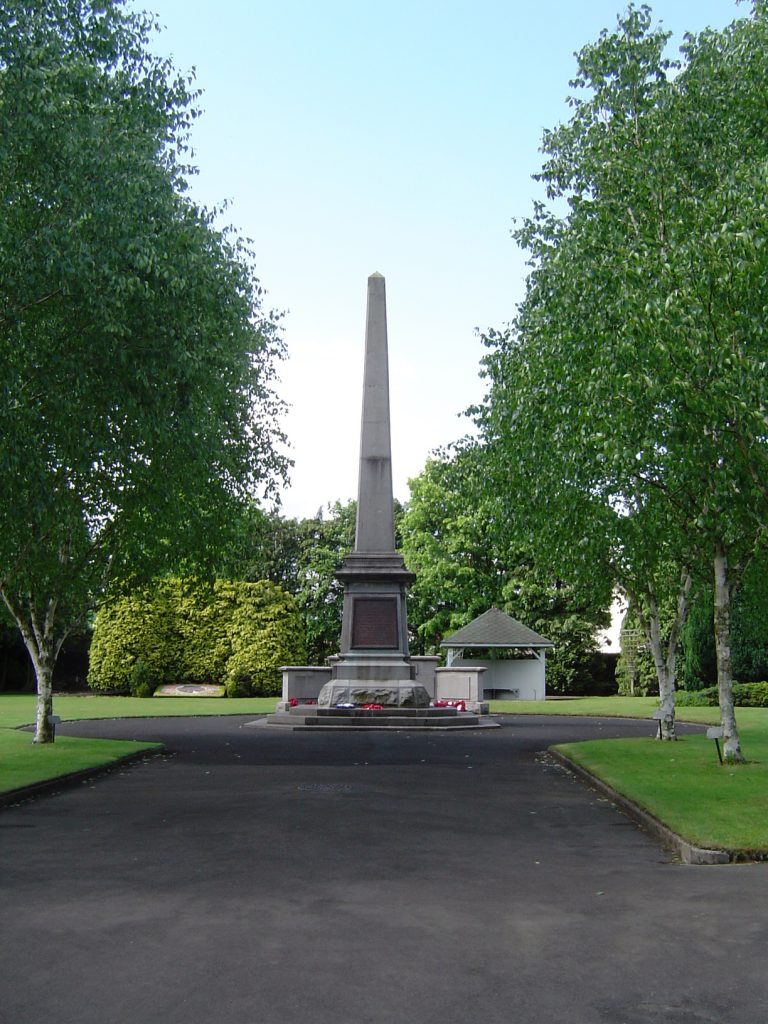
Ballymena Memorial Park and Obelisk is located at Galmorm Road opposite the Police Station. The Memorial Park was given to the town in 1917. The Park was opened and the Obelisk unveiled on 11th November 1924. Major-General Sir Oliver Nugent formally declared the Memorial Park open and unveiled the Memorial and Major-General Simms performed the dedicatory service.
There are 491 names of the Fallen from the Great War on the memorial; that meant that between 3,000 and 4,000 from Ballymena and district had served in the armed services. About 1,500 of them served in the 12th Battalion R.I.R., which was recruited in County Antrim and formed part of the 36th Ulster Division.
The inscription reads:
“1914-1918. To the Glory of God and in everlasting memory of the officers, non-commissioned officers, and men from the Ballymena urban and rural districts who fell in the Great War. They shall not grow old as we that are left grow old; age shall not weary them, nor the years condemn. At the going down of the sun and in the morning we shall remember them.”
BALLYMENA MEMORIAL UNVEILED.
491 NAMES ON HONOUR ROLL.
SPEECH BY 36TH DIVISION CHIEF.
ALL BUSINESS AT STANDSTILL.
Armistice Day had a special significance in Ballymena this year by reason of the fact that an opportunity was taken to unveil and dedicate the war memorial which had been erected by public subscription in the memorial park in memory of the 491 officers, non-commissioned officers, and men from the urban and rural districts of Ballymena who fell in the Great War.
The monument is in the form of an obelisk, 33 feet high above the ground, set on an octagonal platform 18 feet in diameter, and rising by three steps. The die of the monument is mounted on a heavily-moulded base, and contains on the front a bronze panel bearing the dedicatory inscription and on the other three sides the names of the 491 officers and men from the town and district who made the supreme sacrifice.
The inscription reads: “1914-1918. To the Glory of God and in everlasting memory of the officers, non-commissioned officers, and men from the Ballymena urban and rural districts who fell in the Great War. They shall not grow old as we that are left grow old; age shall not weary them, nor the years condemn. At the going down of the sun and in the morning we shall remember them.”
Business was practically at a standstill in the town all morning, the public works and business premises closing about ten o’clock, and there was an exceptionally large attendance of the general public, both inside and outside the park. A special platform had been erected and reserved for the relatives of the men who fell and served, and this was crowded to overflowing. Detachments of the following were present-Ballymena branch of the British Legion, in command of Captain R. M. Pryde; Voluntary Aid Detachment, Miss Simpson commandant; R.U.C., under Captain A. Small, D.I.; B Special Constabulary, under Mr. G. C. D. Young, M.B.E., district commandant; CI Special Constabulary, under Captain Carson; Girl Guides, under Mrs. Malcolm Patrick, Divisional Commissioner ; Boy Scouts, under Mr. W. Stuart, C.E., President Mid – Antrim Scouts’ Association; C.L.B., under Lieut. W. M. Perry and Sergeant-Major S. Mooney; Captain R. S. Hanson M.C., who was in general command. The British Legion, R.U.C., and Special Constabulary were drawn up at the monument, forming three sides of a square. The Ballymena Brass Band was in attendance.
At 10-40 sharp Major-General Sir Oliver Nugent, who performed the unveiling ceremony, and was accompanied by Major-General the Very Rev. Dr. Simms, C.B., C.M.K., M.P., arrived, and was received by the Chairman, Mr J. N. Lamont, U.C., and members of the War Memorial Committer.
Immediately on arrival Major-General Nugent inspected the detachment of the British Legion and the Voluntary Aid Detachment, all of whom wore their war service decorations.
A pathetic feature of the parade was the presence of three boys, Masters F. Colgan, Samuel Beatty, and James Nicholl, wearing war decorations and bearing a wreath of the British Legion. Colgan’s father and brother fell in the war, and the other lads lost their fathers. The two minutes’ silence was signalled by the Gasworks’ siren, and during this solemn period uncovered heads were reverently bowed, and there was intense silence over the huge throng.
Subsequently a mixed town choir, under the leadership of Mr. John Kirkpatrick, led in the singing of the hymn: “O God, Our Help in Ages Past,” after which the Rev. J. A. Cullen, rector of Ballymena, read a portion of Psalm 46, and Rev. Dr. Haslett and Captain Rev. T. Warwick led in prayer.
Major-General Nugent, prior to unveiling the memorial, returned thanks for the high honour which had been conferred upon him by asking him to be present, because he knew many of those whose names they were commemorating that day, some of them personally and others by the work they did. He knew how richly they had earned the gratitude of their fellow-townspeople.
Continuing, he said the part played by Ulster in the Great War was worthy of the traditions and the race and character of its people. The part that Ballymena and district had played was, he thought, an honourable one and worthy of the province. There were 491 names on that memorial; that meant that at least between 3,000 and 4,000 from that district had played their part. He thought he was right in saying that about 1,500 of them served in the 12th Battalion R.I.R.., which was recruited in County Antrim and formed part of the Ulster Division.
To that splendid body of soldiers he had only the happiest memories. They were excellent fighters, splendid workers, and throughout their service they maintained the same high sense of duty which characterised the other units of the Ulster Division.
Continuing, he said the part played by Ulster in the Great War was worthy of the traditions and the race and character of its people. The part that Ballymena and district had played was, he thought, an honourable one and worthy of the province. There were 491 names on that memorial; that meant that at least between 3,000 and 4,000 from that district had played their part. He thought he was right in saying that about 1,500 of them served in the 12th Battalion R.I.R.., which was recruited in County Antrim and formed part of the Ulster Division.
To that splendid body of soldiers he had only the happiest memories. They were excellent fighters, splendid workers, and throughout their service they maintained the same high sense of duty which characterised the other units of the Ulster Division.
MEMORIAL PARK DECLARED OPEN.
Concluding, he formally declared open the Memorial Park and unveiled the Memorial to those who had fallen, and he added, “May their names live for ever.” Major-General Simms then performed the solemn dedicatory service, and delivered a short address, in which he counselled them to remember not only those who had fallen and those who had returned, but also to remember their wartime vow to care for the dependants of those who had gone forth, and had made the great sacrifice so that liberty and freedom might be ours.
The chairman of the War Memorial Committee, Mr. Lamont, afterwards handed over the Memorial and Park to the care and custody of the Urban Council, and the chairman of the latter body, Mr. A. L. M’Clelland, accepted it in the name of the Council. After the sounding of the Last Post by Bandsman Smillie, of the Seaforth Highlanders, the flag was hoisted to topmast, and the ceremony concluded with the National Anthem. A large number of wreaths were subsequently placed at the base of the Memorial by representatives of the Urban Council, the War Memorial Committee, British Legion, Girl Guides, Boy Scouts, Ballymena Brass Band, other organisations and associations, and by relatives of those who fell.
The business of the Ballymena Quarter Sessions, conducted by Judge Bates. K.C., did not commence this morning until after the termination of the ceremony at the Memorial Park. The thoughts of the Ballymena legal profession naturally turned to two of their former colleagues who made the great sacrifice-Robert C. Orr, captain, 3rd Battalion Somerset Light Infantry, who was killed in notion at Ploegsteert, Flanders, in December, 1914, and Lieutenant Spence Boal, LL.B., Royal Garrison Artillery, who fell at Dernacourt in January, 1917. Brass tablets in the Bar Room of Ballymena Courthouse perpetuate the memory of these gallant members of the legal profession.
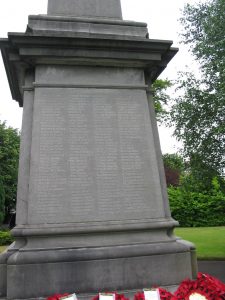
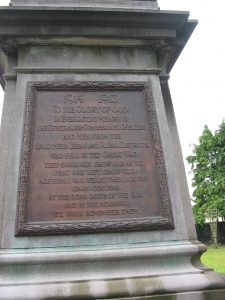
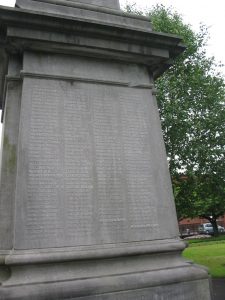
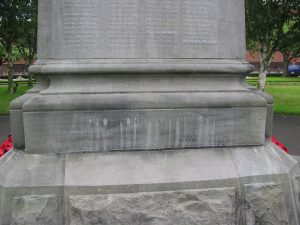
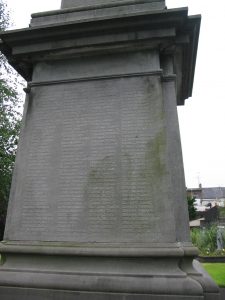
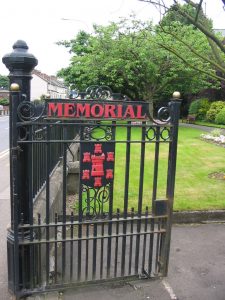
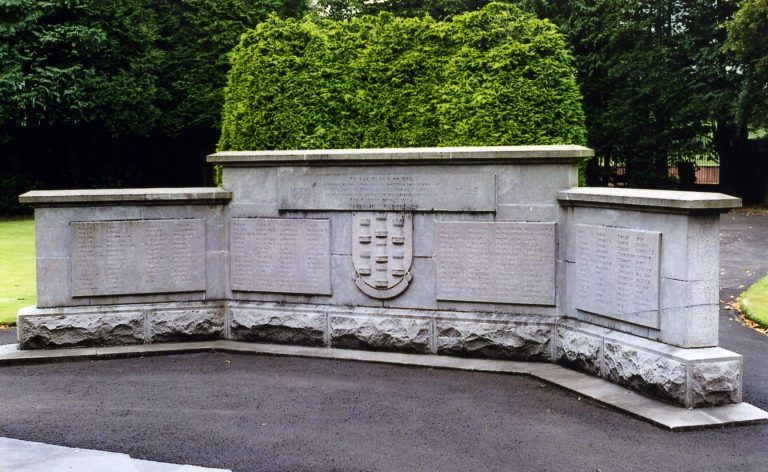
If you can supply additional information, photographs of War Memorials in the nine counties of Ulster, or wish to report errors, broken links, make comments, suggestions, requests, etc. please email
uwms@outlook.com
All contributions will be acknowledged.
Reserch service available when time permits.